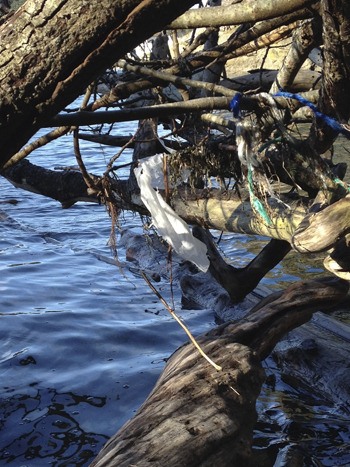By Cali Bagby and Colleen Smith Armstrong
Staff Report
While many cities have banned plastic grocery bags, Washington may become the first state in the nation to outlaw these consumables.
House Bill 1877 and Senate Bill 5780, both bills to ban plastic bags and promote reusable bags, were introduced last year and both failed to pass.
Similar bills House Bill 2404 and Senate Bill 5780 were reintroduced again this year by Rep. Joe Fitzgibbon and Rep. Marko Liias. The legislation is aimed at protecting Puget Sound wildlife and the environment from plastic bag debris.
Both bills would allow plastic bags for fresh meat, fruits, vegetables, nuts or other bulk items, dairy products, ice and cooked foods.
Although the statewide ban did not pass this year, Stephanie Buffum, director of Friends of the San Juans, said it’s not bad news.
“We had an amazing presence this year in the legislature. We had a great hearing, worked closely with the Chairs of the House and Senate Environment Committees, got support for the bill from the Speaker of the House and the majority leader,” Buffum said. “We started a great conversation, and it’s only going to get better.”
Buffum said the bags not only choke wildlife, but break into small pieces of plastic concentrate full of deadly chemicals like PCB.
“This is horrible, especially since Southern Resident orcas and chinook salmon have some of the highest concentration of PCBs in their bodies compared to other populations along the West Coast,” Buffum wrote in a letter urging people to contact state representatives about banning the bag.
Whales and sea turtles often feed on plastic bags mistaking them for squid, and birds often confuse plastic pellets for fish eggs.
A study of 38 green turtles found that 61 percent had ingested some form of marine debris including plastic bags, cloth, and rope or string, according to the United States Environmental Protection Agency.
In 2010, a gray whale that washed up on Arroyo Beach in West Seattle had 20 plastic bags, towels, surgical gloves, sweat pants, plastic, duct tape, and a golf ball in its stomach.
“Nothing should die because it’s ingesting consumable products,” said Buffum, who is pushing for the elimination of plastic bags at store checkouts in Washington state. “We could be doing better in terms of designing a better bag and modifying our behavior. It’s a pretty simple task.”
Opponents of the bills say they would limit consumer choice, represent an unnecessary government overreach and spread germs.
A study by the American Chemistry Council, found there might be microbes in reusable bags, when they are not washed properly.
Local businesses have expressed support of the bill, including Jennell and Brian Kvistad of Blossom Grocery on Lopez Island, Steve and Terri Mason of the Shaw General Store on Shaw Island and Verne Howard of Kings Market and Friday Harbor Market Place on San Juan Island.
In a press release signed by the above businesses, they wrote “as grocery and retail store owners, we don’t need to provide plastic bags to customers at checkout.
Many people bring their own reusable bags and others may opt for paper sacks. This keeps plastic out of the environment and saves businesses on overhead costs, which are passed on to the consumer anyway. We know that running responsible businesses means that we have to be good stewards of the environment.”
Jason Linnes, manager of Island Market on Orcas, says his store has never used plastic checkout bags.
“We’re not a fan and we never have been a fan,” Linnes said. “Plastic bags don’t fit as much as paper bags. Island Market has never used plastic as its main grocery bag because they are just disgusting.”
Linnes says he supports a state-wide ban of plastic at checkout stands.
Orcas Homegrown Market and Gourmet Delicatessen only uses plastic in the produce department and it’s the same story at Orcas Village Store.
“Pretty soon I will be using only paper in the produce section — as soon as the plastic rolls run out,” said co-owner Ron Rebman, who favors the proposed ban.
In a letter to Rep. Kristine Lytton, the County Council expressed their support of the bill, citing unnecessary pollution of plastic on the islands as their main concern. The council wrote that more than 10,000 pieces of micro-plastic was picked up in just one day on Orcas Island, and that University of Washington-Tacoma have found plastic in every water sample they have taken from Puget Sound.
The Friday Harbor Town Council successfully banned Styrofoam to-go food containers in 2009 and began a discussion about the use of plastic bags in a meeting on Feb.2.
Buffum said that if the statewide bill fails then they will push to ban bags at the local level. Passage of either bill would make Washington the first state to ban plastic grocery bags. As of Jan. 11, Edmonds, Mukilteo, Seattle and Bellingham have each prohibited plastic grocery bags.
“We’re living on the edge of Salish Sea and Puget Sound and we can reduce plastic pollution and save wildlife,” Buffum said. “And I think Washington has been a pretty big leader with clean up.”
For more info, visit www.droptheplasticbag.org or plasticbagbanreport.com



